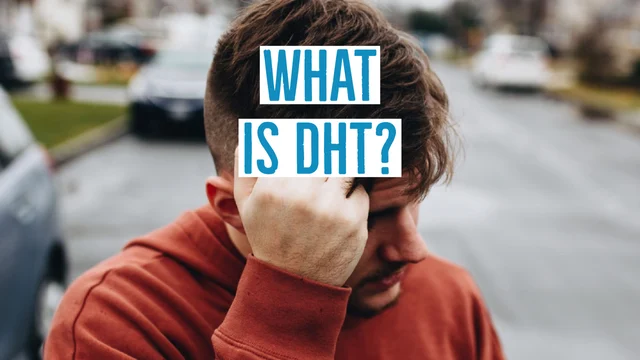Which is right for you? Propecia (aka Finasteride) – is an FDA approved drug that aids in slowing, stopping and even reversing hair loss through the reduction of the amount of DHT in our bodies. DHT is also important when it comes to sexual development during puberty. Propecia is a systemic 5-alpha-reductase inhibitor that often […]
Blog

What is DHT (Dihydrotestosterone)? – Should You Block it?
Should You Block DHT? There is a general misconception surrounding DHT which leads most people to think that it is simply a negative androgen byproduct which sole purpose is to increase prostate size and make your hair fall out. But is this really true or is there more to it? Is it absolutely necessary to eliminate […]
Having Hair Loss after a Baby? Postpartum Hair Loss and New Set of Products to Fix it.
Postpartum hair loss is the sudden shedding and l oss of hair around three months after giving birth. So you’ve had a successful childbirth. But now you’ve noticed clumps of your hair falling out! You begin to wonder if this is the affect of the stress of the pregnancy, or giving birth, or now of taking care […]

Hair Loss – Menopause’s Dirty Little Secret and How to Fix it
We all know that menopause can come with a multitude of not so pleasant symptoms. Women know about hot flashes, night sweats, mood changes, weight gain, and lack of energy. Those are commonly talked about and somewhat expected. For a lot of women though one of the most shocking, traumatic, and sadly least discussed, symptoms […]

Natural DHT Blockers that Work!
Suffering from hair loss is a terrible situation for many people. It changes the way you view yourself and can lead to depression or loss of self-esteem. Due to this, many of us look for natural solutions to combat hair loss such as nutritional supplementation. For those suffering from Genetic hair loss, theuse of a […]
Platelet Rich Plasma for Hair Loss?
Whether it’s genetic, due to an underlying medical disorder, dietary deficiency, stress, or simply poor hair care; hair loss is a major concern these days. In a world of so many hair loss treatment options, PRP is becoming increasing popular as celebrities and physicians are using it more and more to improve hair density and reverse […]
Laser Hair Therapy and How to Use it Correctly for Hair Growth: Presented by William Gaunitz, WTS
William Gaunitz speaks in Chicago Illinois at the International Association of Trichology Conference 2016. William spoke about the use of low-level laser therapy for hair growth as well as best practices to ensure the highest quality of end result. William also discusses overstimulation and risks of laser as well as use of product, detoxification, and […]
Does the iGrow Laser Work? Explained by Trichologist William Gaunitz
Transcription for iGrow Laser Reviewed and Explanation video: For iGrow Laser Packages mentioned in the video. Hi. My name is William Gaunitz, founder of Evolution Hair Loss Institute and Advanced Trichology. Today I really want to talk to you about the iGrow laser. We have been using the iGrow laser now since 2011 for many of our at-home programs. Quite frankly, I […]
Capillus 272 Laser Reviewed
I first heard of the Capillus 272 Laser Cap about three years ago. This device was the new competitive device that was directly competing against the LCPRO LaserCap by Transdermal Cap. The Capillus 272 had only one clear design difference and one clear guarantee difference. Design: it had 48 more pulsed laser diodes (272 diodes) than […]
Hair Loss Treatment Success at the Phoenix Evolution Hair Loss Institute in 9 Months!
In the Evolution Hair Loss Institute in Tempe / Phoenix Arizona, client Justin received amazing treatment success after only 9 months on the Evolution Hair Regrowth Treatment Program. See his results below or call the clinic for a free consultation for your own hair loss treatment needs at 480-222-4247. Evolution Hair Loss Institute is based in […]
